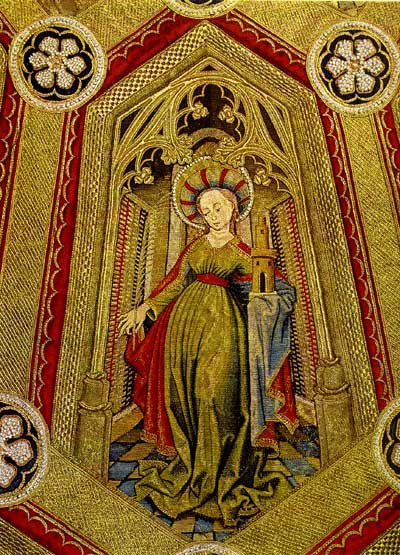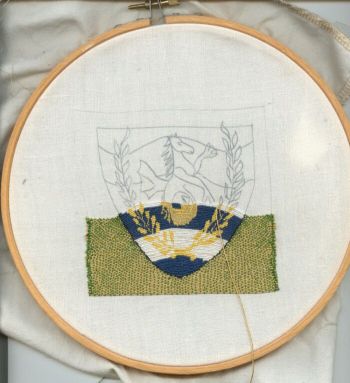Or Nue is also called “shaded gold”, and this describes the technique exactly.
In this style of goldwork, coloured silk thread is used to couch gold thread (usually Jap) and the shading of the coloured silk threads makes up the picture.
The stitching deliberately lets the gold show through, and the density of the couched threads shows the different shadings, and even allows perspective in a design to be shown.
Origins
Or Nue originated in Flanders in the fifteenth century, and was primarily used for ecclesiastical embroideries. The technique reached its heights in Italy and Flanders, with extremely intricate executions, such as the example below of one of the sections of the Mantle of the Golden Fleece.

Or Nue is still a popular form of goldwork, often used for nature designs, such as the link (below) to the Dragonflys by Tanya Berlin of Berlin Embroidery. As you can see from these, Tanya has stitched the same pattern using different metallic Jap for her ground – Gold, Copper and Silver – and the different colours of the metal give very different effects!
Technique
Or Nue must be stitched in a hoop or frame in order to maintain the correct tension. In addition, you must be prepared to work with several different needles at the same time – a feat in itself!
Below is a piece of Or Nue I started (my first piece in this technique) and I’ll use this to explain the technique, and some of the mistakes I made and how these can be corrected.

The first thing that will strike you is the “lump” that formed as I was stitching. This was a fault of the materials I chose to use.
This piece was stitched on calico using gold Jap grounding, and two threads of DMC stranded cotton thread. First mistake – using the 2 strands. Second mistake – using cotton not silk.
The lump is caused because the thread used was too thick and didn’t “pack down” with the gold as I stitched, so the distinctive lump was formed.
I should have used one strand of silk for this stitching – especially flat spun silk. Silk has better “crushability” than cotton. It will pack down flatter and so the lump will not happen.
I should also have not stitched the “pattern” section as solid colour as I did, and not have couched as close as I did with the background.
The background couching should have been an inch or more apart, and the pattern a half-centimetre or so apart, so that the gold shows through.
There are two ways of laying the gold background. The method I have used involves turning the jap at the end of each row, and I will need to cover those edges to finish the piece.
The second method involves cutting lengths of Jap for each row, and sinking them through the fabric at the beginning and end of each row, and fastening them in place. With this method, you need to be extremely precise about your beginnings and endings to ensure that they align exactly.
Many existing Or Nue pieces show intricate designs in couching down the jap outside the pattern – many with an intricate woven look that really catches the light and makes the whole piece sparkle.
Or Nue, in fact all forms of goldwork, are a sumptuous form of embroidery, and one that it is well worth mastering – especially if you just love the “bling”!
Links
Berlin Embrodiery Or Nue Dragonfly
Or Nue Chasuble at the Hermitage Muesum
Recommended Reading
Beginners Guide to Goldwork by Ruth Chamberlain
The Art & Craft of Goldwork by Antonia Lomny
Goldwork Embroidery; Designs & Projects by Mary Brown
Is there anything that you would particularly like to see an article on? If so, please contact me with your suggestions.
Happy Stitching

© 2008 Megan McConnell


